If you have a teenager in the house you have a lot of things to worry about. You want her to be successful in school, to have a lot of friends and to be happy. Whether you realize it or not, you also need to worry about substance abuse. You might think that your child is too well adjusted to ever try smoking, drinking, or using drugs, but you might be wrong. No teen is immune from peer pressure. Among the many worries we have as parents today, there’s a new one: e-cigarettes.
What Are E-Cigarettes?
E-cigarettes are electronic devices that deliver nicotine in water vapor instead of in cigarette smoke. Inside each device is a battery that warms up a vial of nicotine dissolved in water. The user inhales nicotine and exhales water vapor. Supporters of e-cigarettes say that the devices can be used to help smokers quit. It gives a smoker a safer alternative to use in order to be weaned from nicotine. Smoking an e-cigarette is called vaping.
Are E- Cigarettes Harmful?
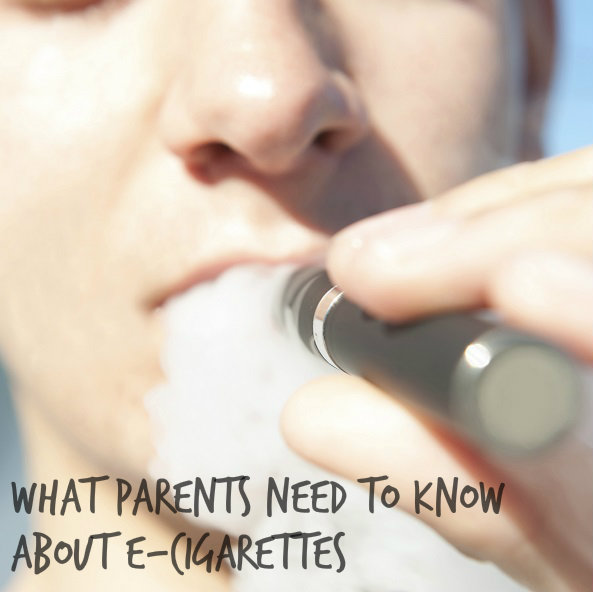 One of the main problems with e-cigarettes is that they are new and not fully tested. While proponents say that they are safe and that even the second-hand vapor is safe, we really don’t know for sure. What we definitely know is that an e-cigarette delivers hits of nicotine, a mind-altering, highly addictive substance. They may be free of all the toxins in cigarette smoke, but if your teen vapes she will become addicted to nicotine. We also know that nicotine can cause cognitive defects in young brains that are long lasting.
One of the main problems with e-cigarettes is that they are new and not fully tested. While proponents say that they are safe and that even the second-hand vapor is safe, we really don’t know for sure. What we definitely know is that an e-cigarette delivers hits of nicotine, a mind-altering, highly addictive substance. They may be free of all the toxins in cigarette smoke, but if your teen vapes she will become addicted to nicotine. We also know that nicotine can cause cognitive defects in young brains that are long lasting.
Another concern is the possibility of e-cigarettes acting as gateway drugs. Research has shown that people who abuse drugs or are addicted follow a pattern. They start with cigarettes or alcohol, and then move onto illegal and harder substances. Teens using e-cigarettes because vaping seems cool and largely safe put themselves at risk for future substance abuse.
Are Teens Using E- Cigarettes?
It may seem unlikely that teens would be interested in a device designed to help smokers quit, but the statistics say otherwise. According to the Centers for Disease Control and Prevention, more than a quarter of a million young people used e-cigarettes in 2013. This number represents only the teens who had never smoked a real cigarette before. This means that e-cigarettes are responsible for getting a huge number of teens hooked on nicotine who may never have tried smoking otherwise.
How Can I Protect My Teen From E- Cigarettes?
The best way that you can protect your teens from the potential dangers of e-cigarettes is to talk to them. You can’t always be watching and guiding them, but they do value your opinions. You have the potential to influence their choices, even when you aren’t by their side. Let them know that you don’t want them to vape or use real cigarettes.
By talking to your teens about e-cigarettes you also give them the power of information. Many teens start using these devices with the false assumption that they are perfectly safe. They may be safer than cigarettes, but they are not safe and there are many risks involved. Educate your teens and help them to be aware of the risks and you will empower them to make better decisions. E-cigarettes are likely here to stay, and they are useful tools for smokers, but they pose risks to our young people. By spreading awareness we can all do our part to protect them.
E-Cigarettes Being Secretly Used To Hide Drug Use – See How They’re Getting Away With This!
OxyContin is the brand name of an extended-release painkilling medication that contains the opioid narcotic substance called oxycodone. In its original form, this medication was easy to tamper with and use as a source of opioid abuse. In response to this situation, the manufacturers of OxyContin reformulated the medication and made it considerably more tamper-resistant.
In a study published in June 2014 in the journal Drug and Alcohol Dependence, a team of U.S. researchers investigated whether the reformulation of OxyContin has had the desired effect of reducing the number of people who use the medication in a pattern of opioid abuse.
Oxycodone And OxyContin
Oxycodone is a generic opioid medication noted for its usefulness in the relief of various forms of serious or severe pain. Like all other opioid drugs and medications, it can trigger diagnosable problems with abuse or addiction when used in ways not sanctioned and monitored by a doctor. Some branded medications contain oxycodone in combination with other, less-powerful painkilling substances such as acetaminophen, aspirin or ibuprofen.
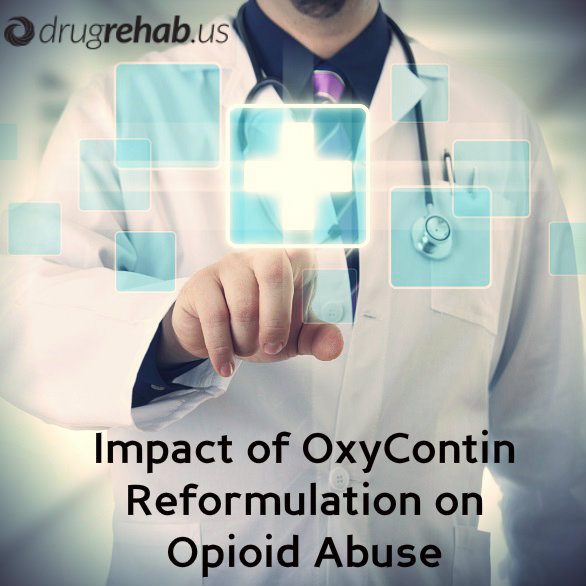 Common examples of these combined medications include Percocet, Endocet, Percodan, Combunox and Roxicet. Other branded medications contain only oxycodone as their active ingredient. In addition to OxyContin, examples of these medications include Oxecta and Roxicodone.
Common examples of these combined medications include Percocet, Endocet, Percodan, Combunox and Roxicet. Other branded medications contain only oxycodone as their active ingredient. In addition to OxyContin, examples of these medications include Oxecta and Roxicodone.
OxyContin arrived on the U.S. market in 1995. It is specifically designed to provide extended amounts of pain relief to people affected by ongoing moderate or severe pain. Since it must produce its effects for many hours, an OxyContin tablet contains more oxycodone than most other available medications.
Unfortunately, in its original form, the medication was highly susceptible to crushing, chewing, dissolving and other forms of manipulation that made its oxycodone content available all at once. This fact made OxyContin a prominent target for abuse by people seeking the recreational drug effects of opioid intake. Widespread availability of the medication also contributed to its prominent role in opioid abuse in the U.S.
OxyContin Medication Reformulation
Along with addiction specialists, public health officials and drug enforcement officials, the manufacturers of OxyContin (Purdue Pharma LP) became well aware of the role that abuse of the medication played in the larger phenomenon of prescription opioid abuse.
In response, they withdrew the original formulation of OxyContin from the market and, in August 2010, released a new version of the medication that is substantially harder to use as a source of abuse. Specific steps taken during this reformulation include minimizing the availability of oxycodone even after crushing or other manipulation occurs, as well as making it impossible to pass a dissolved form of the medication through a syringe for injection.
Impact Of OxyContin Reformulation On Opioid Abuse
In the study published in Drug and Alcohol Dependence, researchers from the University of Kentucky and Purdue Pharma used interviews with a group of 189 adults with a prior history of abusing OxyContin to assess the effectiveness of the new formulation of the medication in discouraging opioid abuse. During these interviews, each participant was asked to compare their monthly level of involvement in opioid abuse before the OxyContin reformulation to their monthly level of involvement after the reformulation.
After analyzing the results of the interviews, the researchers found that 33 percent of the participants had tried to abuse the reformulated version of OxyContin in the month before the study. This contrasted with a 74 percent rate of monthly OxyContin abuse prior to the reformulation, as well as with a 96 percent rate of monthly abuse for any form of immediate-release oxycodone.
Individual rates for snorting and injecting the reformulated medication were also substantially lower than the snorting and injection rates associated with both the old version of OxyContin and oxycodone products that release immediately into the bloodstream. Overall, the study participants tried to abuse the reformulated OxyContin on roughly two out of 30 days. In contrast, abuse of the original version of the medication took place approximately 13 days a month, while abuse of immediate-release oxycodone took place about 20 days a month.
The researchers note that abuse of the old version of OxyContin among the study participants became much less common after the new version of the medication reached the market. In addition, they note that the participants rarely shifted from oxycodone abuse to heroin use. All told, they concluded that, at least among the people who took part in the study, the new version of OxyContin does not play the same prominent role in opioid abuse as the original version of the medication first released in the 1990s.
Do You Or Someone You Know Need Help With Prescription Drug Addiction?
Call Us Now! Help is Available 24/7!
Now that you are an adult and your parents are older, it may become your responsibility to care of them. Even if they don’t need round-the-clock care, it is important that you make sure your parents are happy and healthy and living well.
Part of that means watching for signs of drug abuse and protecting them from the risk of getting hooked on drugs.
It may seem like a worry you should never have to consider, but the truth is that drug abuse among older Americans is on the rise. Here’s how you can protect your parents.
Protecting Your Parents From Addiction
Get Educated
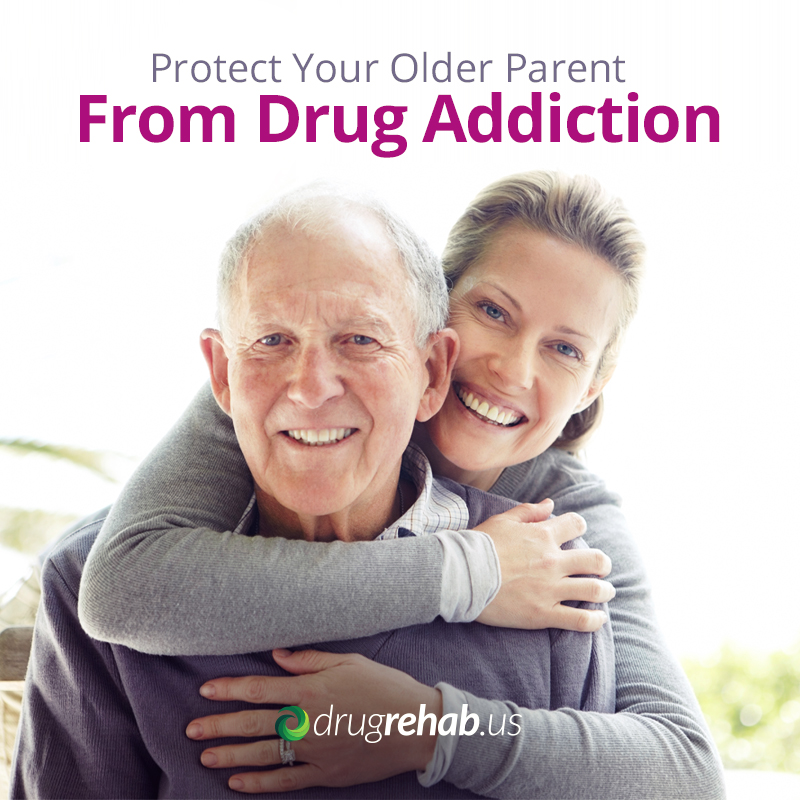 To protect parents from the dangers of substance abuse, it’s important that you understand the issue. Educate yourself about senior substance abuse and addiction so you are aware of the risks and the signs. Although it’s surprising, substance abuse among seniors is not that unusual. In fact, it is a growing phenomenon. Estimates show that by 2020, the number of older Americans needing treatment for a substance use disorder will have doubled. Just a few years ago, nearly five percent of adults over 50 were abusing drugs or alcohol.
To protect parents from the dangers of substance abuse, it’s important that you understand the issue. Educate yourself about senior substance abuse and addiction so you are aware of the risks and the signs. Although it’s surprising, substance abuse among seniors is not that unusual. In fact, it is a growing phenomenon. Estimates show that by 2020, the number of older Americans needing treatment for a substance use disorder will have doubled. Just a few years ago, nearly five percent of adults over 50 were abusing drugs or alcohol.
There are several reasons older Americans are susceptible to substance abuse. One is access to prescriptions. Nearly one-third of prescriptions in the U.S. are written to people over 50. Becoming dependent on habit-forming prescriptions is more likely the more they are prescribed. Seniors are also more likely than younger people to experience certain social factors that may contribute to substance abuse: social isolation, a feeling of uselessness after retirement, the loss of a spouse, and depression.
Talk About Drug Abuse
Armed with the facts, start a discussion with your parents. It may be awkward or uncomfortable at first, but knowledge is power. If you can make your parents understand how risky it can be to abuse their prescriptions or to drink too much, they will likely make better decisions. They may also be unaware just how their emotional health impacts the choices they make regarding substances. Encourage your parents to get involved in social activities and to talk to you if they are feeling lonely, depressed or sad.
Help Manage Prescriptions
Abuse of prescriptions by seniors is often unintentional. Many get hooked simply because they need a drug, like a painkiller, to feel better and then use of it spirals out of control. With many different prescriptions, which is common with seniors, it can get confusing. Your parents may end up making mistakes with doses and combinations. Go to appointments with your parents and take careful notes about medications, dosages and interactions. Help your parents organize medications and monitor their drugs to be sure they are taking them correctly.
Monitor Behaviors And Get Help
Drug abuse has telltale signs, no matter the age of the user. Spend time with your elderly parents and watch for changes in health or behaviors that trouble you. Drug or alcohol abuse can cause changes in sleeping habits or appetite, irritability or anxiousness, confusion, and an increased number of falls. You know your parents, and if anything changes that makes you uncomfortable, be suspicious.
If you do suspect substance abuse in a parent, don’t hesitate to get help. Treatment options are available and seniors are more open to them than you might think. The good news is that statistics show that patients over 50 are the most successful when it comes to getting addiction treatment. Be there for your parents, guide them, educate them and help them when they need it so that you will have many more years to enjoy spending time together.
Get The Know-How On Why Substance Abuse Is Rising Among Seniors
07 Oct 2014
Protecting Older Loved Ones From Substance Abuse
When you take care of your aging parents you are paying back all the years of love and care they took in raising you. You are also doing something out of love. You care for your parents and want them to be safe and comfortable as they age. Whether or not an older parent lives with you, you hope to be an advocate, a caregiver and someone on whom they can rely. What you probably never thought you would have to worry about is substance abuse. Statistics show that older Americans are abusing drugs more than in any previous generation. How do you know if your mom or dad is taking part in this trend and how do you prevent it?
Substance Abuse In Older Americans
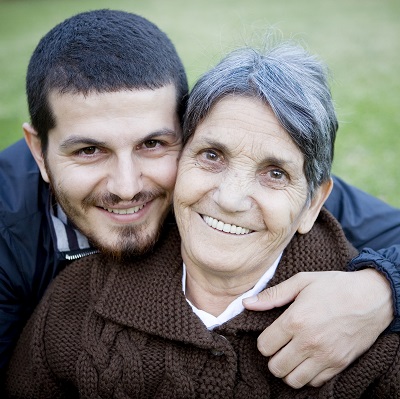 It may seem unlikely, but substance abuse is a real problem in the aging population today. If you have a parent to care for, you should be aware of the issue.
It may seem unlikely, but substance abuse is a real problem in the aging population today. If you have a parent to care for, you should be aware of the issue.
Senior Prescription Drug Abuse
Thirty percent of older Americans take at least five different prescription medications every day, which means they have numerous opportunities to abuse prescription drugs. Abuse of prescriptions is one of the biggest substance abuse problems among the older population. Hospitalization of older patients for prescription-related problems rose nearly 100 percent over a decade from 1997 to 2008.
Senior Alcohol Abuse
The other major type of substance abuse among older adults is alcohol. Access and habit can help to explain why older adults abuse prescriptions and alcohol. Many older people grew up at a time when drinking a cocktail after work every day was considered normal behavior. Depending on the population studied, between 3 and 25 percent of older Americans drink heavily. A particular concern is the combination of alcohol and prescription drugs.
Protect Your Parents From Substance Abuse And Addiction
It is important to understand that there is an issue when it comes to older Americans and substance abuse. You should also understand what makes older adults susceptible to abuse and addiction so that you can protect your parents and any other older loved ones. One reason they may become hooked on drugs is the prevalence of prescriptions. Older people are often prescribed medications, such as painkillers, which are highly addictive. With pain from arthritis, surgery or falls, older adults are more likely than younger people to be prescribed these painkillers.
Another issue with older people is loneliness. As we age our social circles begin to shrink. Many older adults find themselves more alone than ever before. Depression is also a problem as they lose friends or a spouse. Turning to drugs or alcohol to mitigate feelings of sadness, depression and loneliness is not uncommon.
To protect your parents from the possibility of substance abuse or even addiction, it is important that you counteract the factors that make them vulnerable. Monitor the prescriptions that your parents use and talk to their doctors about whether any of them can be abused or are addictive. If any of them are, talk to your parents about the possibility of getting addicted to them. Check with with doctor also to see if any can safely be switched over to a less-addictive prescription
Perhaps most importantly, spend time with your older loved ones. Changing social circumstances can make a powerful impact and you can make a difference. In addition to spending time with them, also encourage your parents to seek out social activities. Get them involved in senior centers where they can meet new people. An active social life, combined with your love and attention, will go a long way toward helping your parents feel good about life. These actions will also help protect them from the growing dangers of substance abuse.
Read More About: The Unimagined Costs Of Having An Addicted Family Member And What You Can Change – Healing Is Possible! Don’t Give Up!
Much of the current drug news from around the country focuses on heroin and narcotic painkillers. Methamphetamine is sometimes thought of as yesterday’s news, but in many areas it is still a raging problem. In 2013, news outlets reported that Tennessee had become the leading state in the U.S. for meth use. Now a new law has gone into effect that legislators and law enforcement officials hope will crack down on the epidemic in Tennessee that is costing taxpayers $1 billion a year.
The Meth Problem
It was more than a decade ago that meth labs started springing up around the country, but particularly in rural areas. Methamphetamine is a controlled substance that can be prescribed by a doctor, but rarely is. The side effects and the potential for abuse are so great that it is a last-resort medication for some medical conditions, including ADHD and obesity.
Effects Of Meth
Meth is susceptible to abuse because it is a stimulant and gives the user energy as well as a euphoric feeling. On the downside, meth can cause:
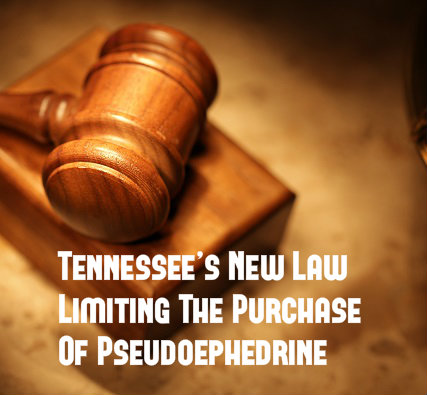 high blood pressure
high blood pressure- an elevated body temperature
- dry mouth
- jaw-clenching
- memory loss
- aggression
- paranoia
- anxiety
- insomnia
- brain damage
- organ damage
- severe dental problems
- violent behavior
It is also highly addictive and with prolonged and continued use, the negative side effects increase.
Meth has become such a huge problem because it is relatively easy to make. With just a few ingredients, including an over-the-counter cough medicine ingredient, anyone can make it in a home lab. These labs are abundant in Tennessee and the drug has been having disastrous effects on individuals and families in the state.
How Tennessee’s New Law Is Limiting The Purchase Of Pseudoephedrine
While other states have enacted and enforced strict laws regarding the purchase of cough medicine that have helped cut down on meth manufacturing and use, Tennessee has fallen behind. A bill passed in April can now change the course of Tennessee’s meth trajectory. The new law restricts the purchase of medicines containing pseudoephedrine, the cough medicine ingredient for making meth, to 48 tablets per month and 240 per year. The cap previously sat at 75 tablets per month. Some lawmakers wanted to slash that maximum even further, but a compromise was set at 48.
It may seem like a no-brainer to restrict pseudoephedrine, but there are plenty of law-abiding Tennesseans who depend on the medication for allergy relief. Some opponents of the bill argued that it was unfair to restrict access to the medication and stated that most of the meth used in Tennessee comes from other states. Still, the majority of lawmakers agreed that slashing the maximum allowance would curb meth use in the state.
As part of the restriction on buying pseudoephedrine, consumers’ purchases of the medication will be tracked. Those with a real medical need for more pseudoephedrine will be able to go over the limit with a doctor’s prescription. The need for more restrictions on meth-making ingredients is great and many feel that this new law meets that need. Others are skeptical, but only time will tell if Tennesseans are really ready to kick the meth habit.
Read Other News In Addiction And Addiction Rehab
19 Sep 2014
Speaking Up About Addiction
Addiction is often a silent disease. While no one is ashamed to talk about having arthritis or high blood pressure, the disease of addiction has long carried a terrible stigma. Those struggling with addiction are too often looked upon, by others as well as themselves, as weak, morally inferior and lacking in willpower. It is difficult to speak up and speak out about the challenges of this disease, but when we do, we can make real, positive changes. Only with awareness and recognition will more addicts get the help they need, while future addictions are prevented.
The Power Of Awareness
 The expression goes that knowledge is power and it carries a great amount of truth. When something like addiction remains shadowed and hidden, ignorance is allowed to grow. When someone knows nothing about addiction, the lies and misinformation seep in along with assumptions and prejudices. Someone who is ignorant about addiction may not be aware that a friend, coworker, or even a family member is struggling with the disease.
The expression goes that knowledge is power and it carries a great amount of truth. When something like addiction remains shadowed and hidden, ignorance is allowed to grow. When someone knows nothing about addiction, the lies and misinformation seep in along with assumptions and prejudices. Someone who is ignorant about addiction may not be aware that a friend, coworker, or even a family member is struggling with the disease.
Raising awareness about addiction can be powerful. Spreading the word about how damaging this disease can be is a great way to prevent people from abusing substances in the first place. Prevention is the best way to help spare people from the pain and suffering caused by addiction. Raising awareness can even help motivate other people to help make a difference. Even for those who never had an interest in drug use or drinking, learning more about addiction can inspire anyone to get involved with helping others.
Awareness can also make big changes over the long term. It might feel as if one person, or one small group, speaking up and talking about addiction makes little difference. The truth is that it can have a snowball effect. Your efforts to reach others inspire the next person, and the next person. When enough people start speaking up, lawmakers start to listen, as do organizations with the means to fund research and treatment. The act of speaking up, even by one person, can be powerful.
Sharing Stories Of Addiction
If you have been impacted by addiction, whether your own or someone else’s, sharing that story is one important way to speak out and raise awareness. The more we speak about addiction and the more we hear about it, the more it loses its mystery and stigma.
Several organizations encourage and host events that allow you to get your story out there:
- The National Council on Alcoholism and Drug Dependence has named September National Alcohol and Drug Addiction Recovery Month. This event encourages people to learn about addiction and recovery as well as treatment options.
- The Substance Abuse and Mental Health Services Administration supports October as National Substance Abuse Prevention Month and provides ideas and events for people to share their stories and to learn more about addiction.
- The U.S. Army supports veterans battling drug addiction by encouraging everyone to learn more about addiction, treatment and recovery. It also advocates for celebrating the successes of those who are in recovery and sober.
When it comes to a disease laden with stigma, the only way to banish the shame and ignorance is to speak up. If you have battled addiction, if you have seen a loved one laid low by this disease, or if you simply care about the issue, speak up, spread awareness and help others learn more about the disease of addiction!
Read Our Other Empowering And Inspirational Posts
Overcoming Addiction Is Worth It & So Are You! – Let Us Help You Take That First Step – Call Us Now!
01 Aug 2014
How To Avoid Getting Hooked On Sleeping Pills
When most of us think about addiction, we envision someone shooting up heroin, smoking meth or drinking nonstop. Did you know that you can develop a dependence on drugs that seem much more harmless? We tend to think of prescriptions as safe because they are prescribed by doctors, but you should always be aware of the risks of any drugs you take. Sleeping pills are used commonly in the U.S. and it is possible to become addicted to them. If you need sleep aids, find out what the dangers are and learn how not to become dependent on them.
Can A Pill Cure My Sleeping Problems?
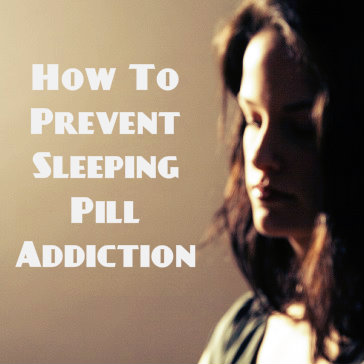 Too many people rely on sleep aids to get a good night’s rest without dealing with their underlying problems. Being unable to sleep is usually a symptom of another problem. You may struggle to sleep because you have another medical condition, but it’s more likely that your insomnia is related to stress. While a sleep aid may help you get some rest, it is not the answer to your problems. Sleeping pills are designed for short-term use, not for lifelong treatment.
Too many people rely on sleep aids to get a good night’s rest without dealing with their underlying problems. Being unable to sleep is usually a symptom of another problem. You may struggle to sleep because you have another medical condition, but it’s more likely that your insomnia is related to stress. While a sleep aid may help you get some rest, it is not the answer to your problems. Sleeping pills are designed for short-term use, not for lifelong treatment.
Are Sleeping Pills Addictive?
If you do use your sleep aid for a long period of time or if you deviate from your doctor’s instructions, you run the risk of experiencing side effects, of not solving the underlying problem causing insomnia and of developing a dependence on the medication. The risk level depends on the medication. Sleep aids include those that help you fall asleep and those that help you stay asleep through the night.
In the first category is Lunesta, which can cause withdrawal symptoms, and Halcion and Sonata, both of which are habit-forming. Among the drugs that can help you stay asleep all night are Estazolam and Restoril, both of which are also habit-forming. There are other sleeping pills that can be prescribed, which are not habit-forming and which do not cause withdrawal when you stop using them. Each one comes with its own list of side effects and some may not work well for you. Which one you take is a decision you and your doctor should make.
Some prescription sleeping pills are habit-forming, which means they are susceptible to abuse and can lead to addiction. Even with those medications that are not considered addictive, there is a risk of developing dependence. When you rely on a pill to get to sleep at night you may become psychologically dependent on it. The idea of not having that crutch to help you sleep can cause anxiety and lead you to keep using the medication, even when you no longer need it.
How Can I Take Sleeping Pills Safely?
The most important consideration in taking prescription sleep aids is to follow your doctor’s instructions. Speak up and discuss with your doctor if you feel like you are becoming dependent on your sleeping pill. Even over-the-counter sleep aids can lead to dependence if you are relying on them every night. If you need to take one for several nights in a row, talk to your doctor so that you can address the underlying reasons for your insomnia.
A sleep aid can be a good way to catch up on rest, but it is not a solution to your problem. Make sure that you get treatment for your insomnia. This may mean going through counseling to address any psychological issues keeping you awake, or trying natural methods or alternative medicine. Always take care when using prescriptions of any kind and keep yourself informed as to the risks and the possibility of dependency.
The device called an e-cigarette is a big story in the news these days. They appeared on the market several years ago as a way to help smokers quit and now they are reaping in billions of dollars in sales every year. Controversies surround these devices; not least of which is the harm they may pose to children and teens. So what is an e-cigarette and what do you need to know about them to protect your children? Get the facts and talk to your kids about e-cigarettes before they experiment on their own.
What Are E-Cigarettes?
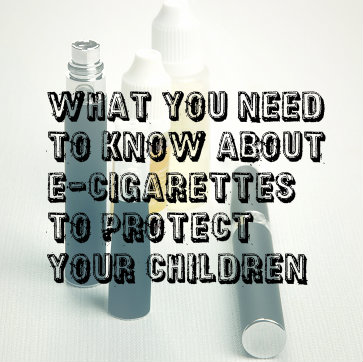 An e-cigarette is a device that uses a battery to warm a small vial of nicotine dissolved in liquid. The user inhales the vapor to get the nicotine and exhales water vapor. The idea is that a smoker can use an e-cigarette to get a nicotine fix without inhaling the thousands of harmful compounds that are in cigarette smoke and which cause health problems. Studies as to whether they really help people quit are ongoing. There is no definitive answer yet, but what seems to be clear is that e-cigarettes are useful for some smokers and not for others.
An e-cigarette is a device that uses a battery to warm a small vial of nicotine dissolved in liquid. The user inhales the vapor to get the nicotine and exhales water vapor. The idea is that a smoker can use an e-cigarette to get a nicotine fix without inhaling the thousands of harmful compounds that are in cigarette smoke and which cause health problems. Studies as to whether they really help people quit are ongoing. There is no definitive answer yet, but what seems to be clear is that e-cigarettes are useful for some smokers and not for others.
Are E-Cigarettes Harmful To Kids?
Although they don’t produce smoke, e-cigarettes are still devices that deliver a hit of a one of the most addictive substances, nicotine. Because e-cigarettes are marketed as a healthier alternative to smoking, most young people inaccurately assume there are no risks in using one. Nicotine is highly addictive and any child or teen using an e-cigarette is at significant risk of becoming addicted to it. There is also the risk of poisoning. Nicotine is poisonous in high doses and the liquid in the e-cigarette can be toxic.
Nicotine is a drug that affects the nervous system, the brain, and the heart. Someone abusing nicotine will experience an elevation in blood pressure and heart rate. High doses can cause a dangerous heart arrhythmia. In rare cases, and with large doses, this arrhythmia can be fatal. With their smaller bodies, kids are more vulnerable to these risks than adults are.
How Do I Protect My Kids from E-Cigarettes?
When it comes to any kind of drug, knowledge is power. Once you understand the risks and dangers associated with e-cigarettes, you can share them with your kids. You should have regular conversations with your kids about substance abuse, alcohol, peer pressure, smoking and other issues they face as children and as teens. Bring e-cigarettes into the conversation and make sure they understand that these devices are not safe.
Also make sure your kids understand how e-cigarette makers are specifically trying to target them to get them hooked on nicotine. The manufacturers make these devices with an array of flavors that mimic fruit, candy, cookies, and specific products that children love, even Girl Scout cookies. The companies making e-cigarettes have no qualms about targeting kids and teens in this way and they even sponsor events, like rock concerts, that attract young people.
Despite the risks, teens and even children are trying e-cigarettes. According to surveys, one in ten high school students has already tried e-cigarettes. As a parent, it is your job to stay on top of the changing landscape of harms and risks posed to your children and to protect them. By learning about e-cigarettes you can help your kids understand all the reasons they should avoid these devices. The risks of nicotine use are too great and we still don’t understand the full danger of e-cigarettes. Keep yourself and your children knowledgeable and you’ll empower them to make better choices.
Learn More About How E-Cigarettes Are Secretly Being Used To Hide Drug Use


